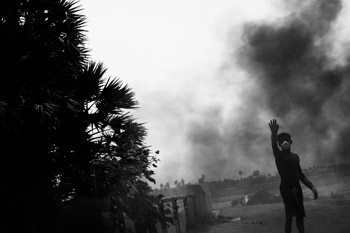Questions Without Answers: A Photographic Prism of World Events, 1985-2010 Photographs by VII

|
|
Photographs by VII
January 21 – April 4, 2010
Public Opening Reception: Thursday, January 28, 5:30-8pm
Remarks by VII photographers at 6:30pm
View the Questions without Answers Mini-site View the Tag Cloud
MEDFORD, MA – The Tufts University Art Gallery, Tufts’ Institute for Global Leadership, and VII Photo Agency proudly present Questions Without Answers, a major photography exhibition on view at the Tufts University Art Gallery from January 21 through April 4, 2010.
A public opening reception, featuring remarks by several featured photographers, takes place on January 28. Questions Without Answers presents photographs from the renowned VII Photo Agency depicting defining events of the post-Cold War period and their aftermaths, from the Fall of the Berlin Wall and September 11, 2001, to Iraq and Afghanistan, The Balkans and Congo, Chechnya and Gaza, among others.
The unique contributions of the independent photojournalists affiliated with VII [see roster, attached] are highlighted in more than 125 photographs, newly printed for the occasion, many displayed for the first time. These photojournalists collectively embody the tradition of concerned photography as their mission is to “document conflict -- environmental, social and political, both violent and non-violent -- to produce an unflinching record of the injustices created and experienced by people caught up in the events they describe.”
As Stephen Mayes, CEO of VII, comments, “[VII’s] work has never been about simplistic representation, but rather about supporting debate and contributing to change.”
The end of the Cold War in 1989 began a new era in world history as globalization, modernization, regional and civil conflicts, complex terrorism, and environmental issues surged to the fore. People, states, and regions struggled to grapple with these ongoing challenges. At the same time, the media was enmeshed in a shift from traditional reportage to the era of multimedia, 24-hour coverage that blurs the distinctions between professional and citizen reporters.
This major exhibition at Tufts offers a prism of both cataclysmic events and persistent conundrums of the last several decades, a prism that mirrors Tufts’ Institute for Global Leadership (IGL) mission, which celebrates its 25th anniversary this year. In 2004, on the occasion of the founding of its program for photojournalism, documentary studies, and human rights called Exposure, the IGL established a partnership with VII Photo Agency.
James Nachtwey, a VII co-founder, commented then that "Exposure will help us all to understand photography as a valuable tool that can help us learn how to make sense of the violence, the destruction, the chaos of this world. Exposure will help to create an incredibly important historical legacy, providing meaning in our lives. Most importantly, it can help to create a public awareness integral to the process of change.”
Since then, VII photographers have mentored Tufts students in workshops in Argentina, Bali, Cambodia, Kashmir, and Kosovo.
This exhibition has been co-organized by the Tufts University Art Gallery, Tufts’ Institute for Global Leadership and VII Photo Agency, with images selected by the directors of the three organizations, with assistance from a Tufts Exposure leader, Samuel James. The exhibition was curated by Amy Schlegel, director of the Tufts University Art Gallery, and designed by Doug Bell. The exhibition anticipates an eponymous book Questions Without Answers: The World in Pictures from the Photographers of VII to be published by Phaidon Press in the fall of 2010.
Participant Information
VII Photo Agency derives its name from the number of founding photojournalists who, in September 2001, formed this collectively owned agency. Together they document conflict -- environmental, social and political, both violent and non-violent -- to produce an unflinching record of the injustices created and experienced by people caught up in the events they describe.
VII members are: Marcus Bleasdale; Ron Haviv; Antonin Kratochvil; Gary Knight; Joachim Ladefoged; Christopher Morris; James Nachtwey; Franco Pagetti; Stephanie Sinclair; and John Stanmeyer; and the estate of Alexandra Boulat.
The VII network is comprised of Lynsey Addario, Eric Bouvet, Jessica Dimmock, Tivadar Domaniczky, Ziyah Gafic, Balazs Gardi, Ashley Gilbertson, Jocelyn Bain Hogg, Benjamin Lowy, Stefano De Luigi, Seamus Murphy, and Donald Weber.
All of the agency’s members and several network photographers’ work are included in Questions Without Answers.
The Tufts Institute for Global Leadership prepares new generations of critical thinkers for effective and ethical leadership and to act as global citizens in addressing the world’s most pressing problems. The Institute emphasizes rigorous academic preparation and experiential learning. It promotes the linkage of theory to practice and exposes students to the rigors and challenges of a diverse world. Through its foundation program, Education for a Public Inquiry and International Citizenship (EPIIC), the Institute has spent the last 25 years educating its students about complex international issues.
Exposure, the Institute’s photojournalism, documentary studies, and human rights program, is dedicated to mentoring and developing young, knowledgeable photojournalists and documentary filmmakers. Exposure is allied with the preeminent photographers of the VII Photo Agency, the Aftermath Project, and other distinguished journalists. Since 2005 VII photographers have mentored Tufts students in workshops in Argentina, Bali, Cambodia, Kashmir, and Kosovo.
The Tufts University Art Gallery, located in the Aidekman Arts Center of Tufts’ Medford campus, organizes and presents exhibitions that explore new, global perspectives on art and art discourse. The Gallery fosters critical dialogue through exhibitions and programs that explore fresh interpretations and scholarship on art, that provide a forum for art produced internationally by emerging and mid-career artists, and that feature new work of established artists. The Gallery also oversees the care and presentation of the University’s Permanent Art Collection.
Tag Cloud
As part of the exhibit, we are creating a "tag cloud", a series of words or short phrases which try to describe the emotional and analytical responses to the issues raised in EPIIC. To that end, we're inviting all current institute students, and all alumni to join us in this endeavor by adding their own words or phrases to the cloud. To see the cloud in progress, click here.

